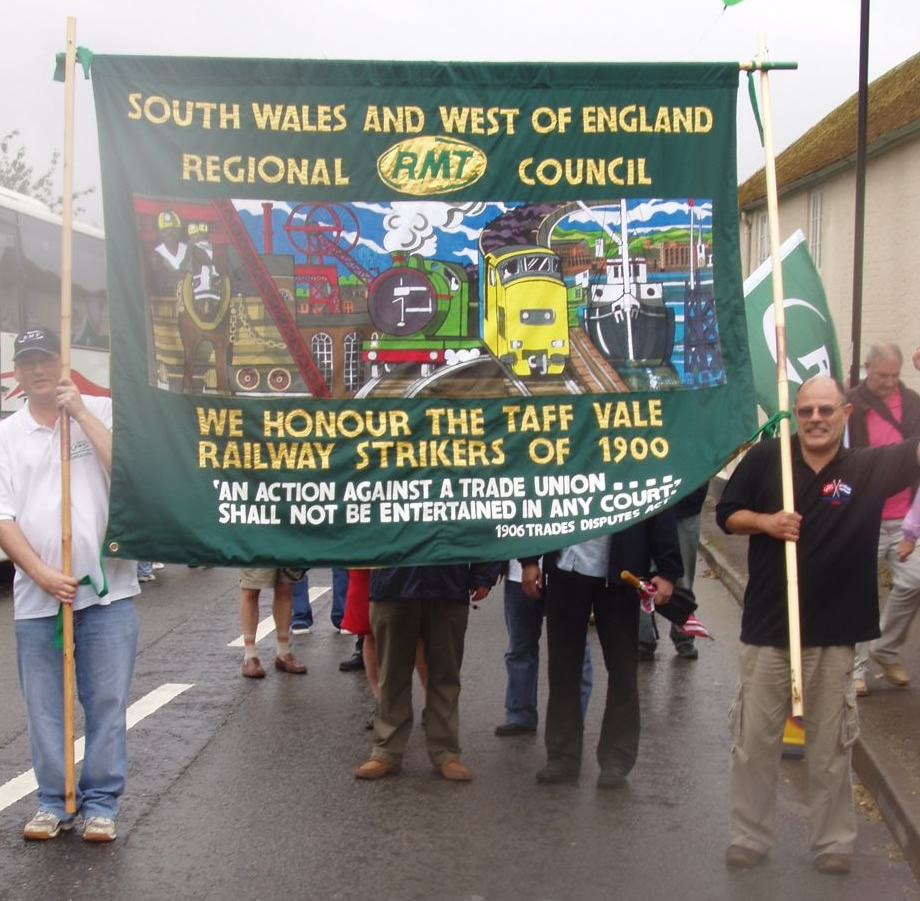Democrat November-December 2008 - Roots of Democracy
Taff Vale Railway Strike
Between 1893-98 coal mining strikes in South Wales brought suffering to railway workers and miners with the suspension of the guaranteed sixty hour week and lay offs. The Taff Vale railway workers moved a quarter of the eighteen million tons of coal dug out by South Wales miners. The Boer war increased the demand for South Wales coal and the miners won pay increases but rail workers did not even though the cost of living increased.

In 1895 the anti-trade union Chairman and General Manager of the Taff Vale Railway and viewed trade unions to be a “very pernicious body as regard railway companies”, held the workforce in contempt and refused to meet the union, the Amalgamated Society of Railway Servants (ASRS).
In 1900 1,327 workers of the Taff Railway Company went on strike. Through highly organised picketing no coal trains ran on the first day. Manager Beasley drummed up strike breakers, known as blacklegs, through the National Free Labour Association. The company ordered strikers and their families to vacate rented company cottages.
The strike lasted eleven days and some common sense was injected by a former chairman of the company and an influential industrialist which pressured the Railway Company to make concessions. A convoluted settlement was agreed but was then broken by the employers.
On the day the strike ended the company was granted an interim injunction to restrain ASRS officials from all forms of picketing. This was extended to the union itself with a declaration that the union could be sued for damages caused by a strike.
The ASRS informed the TUC of the judgement and serious implications for all unions. The TUC immediately instructed its Parliamentary Committee to warn all unions of the implications and to raise contributions to an appeal.
The ASRS appealed against the injunction and to the relief of the trade union movement this was upheld in November 1900. However, Manager Beasley in turn appealed to the House of Lords. This appeal did not take place until July 1901 when the law lords found unanimously in favour of the railway company. The railway company lodged a claim for damages against the ASRS in December 1901.
Despite internal union difficulties whereby the ASRS was prevented from using funds in the defence of the West Country organiser James Holmes, an appeal raised enough money to pay for his defence.
The High Court hearing lasted from 3rd to 16th December 1902 with the Presiding Judge stating that Holmes was guilty of “conduct impossible to excuse”. The jury found against the ASRS on all counts. The total cost to the union was £42,000 (£2.5 million at current valaues).
This Lords decision was welcomed by employers across Britain. Chairman Vassal stated “the importance of the judgement could not be exaggerated”. Whilst a strike was taking place a blackleg workforce could be used which would be free from union ‘intimidation’. If unions acted outside the law they would have to pay losses to the employer from their funds. “A strike under these conditions becomes nearly impossible and without the right to strike, however cautious it may be in using it, a union is impotent.”
During the same period working class people voted Liberal. Trade union leaders who ran for parliament were known as ‘Lib-Lab’ candidates, there were ten in the 1892-5 parliament. In 1893 the socialist Independent Labour Party (ILP) was formed which had a policy of total independent Labour representation in parliament. James Holmes on behalf of ASRS moved the successful resolution at the 1899 TUC which led to the formation of the Labour Representation Committee (LRC).
Unions were divided over support for the LRC and direct representation in parliament. The Taff Vale judgement helped make minds up in favour of a Labour Party in parliament. At the 1906 general election three corner contests were avoided through agreements between the LRC and Liberal Party. It was a Liberal landslide including 29 LRC MPs.
The Liberal Government tabled a Bill on ‘Trade Disputes’ which was trumped by Labour’s Keir Hardie and passed by both Commons and the Lords. This Act legalised peaceful picketing, workers and unions could not be pursued, and union funds were protected.
This was all undone when the Tory anti-trade union legislation set back trade union rights one hundred years which are now supported by a government on the back of the same Labour Party.
Based on RMT pamphlet by Geoff Revell – The Story of the Taff Vale Railway Strike
Roots of Our Rights I and II contain a series in similar vein of historical pieces in pamphlet form and now available for £2.40 the pair post free.